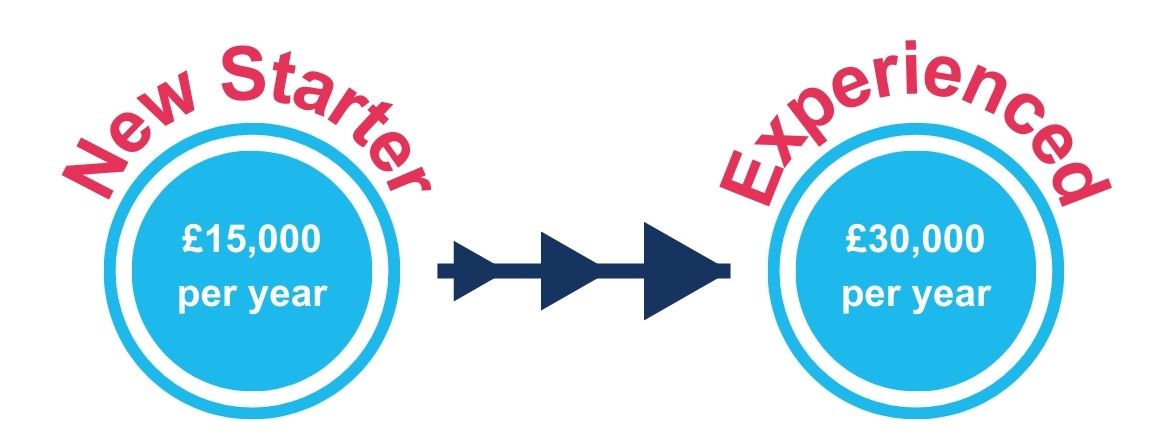A Team leader is a first line management role, with operational and project responsibilities or responsibility for managing a team to deliver a clearly defined outcome. They provide direction, instructions and guidance to ensure the achievement of set goals. Working in the private, public or third sector and in all sizes of organisation, specific responsibilities will vary, but the knowledge, skills and behaviours needed will be the same whatever the role.
Key responsibilities are likely to include supporting, managing and developing team members, managing projects, planning and monitoring workloads and resources, delivering operational plans, resolving problems, and building relationships internally and externally.
Course Requirements
Apprentices will need to have Grade A-C in English and maths at GCSE or have attained Functional Skills Level 2 in both subjects.
Understand different leadership styles and the benefits of coaching to support people and improve performance. Understand organisational cultures, equality, diversity and inclusion.
Understand people and team management models, including team dynamics and motivation techniques. Understand HR systems and legal requirements, and performance management techniques including setting goals and objectives, conducting appraisals, reviewing performance, absence management, providing constructive feedback, and recognising achievement and good behaviour.
Understand approaches to customer and stakeholder relationship management, including emotional intelligence and managing conflict. Know how to facilitate cross team working to support delivery of organisational objectives.
Understand different forms of communication and their application. Know how to chair meetings, hold challenging conversations, provide constructive feedback and understand how to raise concerns.
Understand how organisational strategy is developed. Know how to implement operational and team plans and manage resources and approaches to managing change within the team. Understand data management, and the use of different technologies in business.
Understand the project lifecycle and roles. Know how to deliver a project including: managing resources, identifying risks and issues, using relevant project management tools.
Understand organisational governance and compliance, and how to deliver Value for Money. Know how to monitor budgets to ensure efficiencies and that costs do not overrun.
Know how to be self-aware and understand unconscious bias and inclusivity. Understand learning styles, feedback mechanisms and how to use emotional intelligence
Understand time management techniques and tools, and how to prioritise activities and approaches to planning
Understand problem solving and decision making techniques, and how to analyse data to support decision making.
Able to communicate organisation strategy and team purpose, and adapt style to suit the audience. Support the development of the team and people through coaching, role modelling values and behaviours, and managing change effectively.
Able to build a high-performing team by supporting and developing individuals, and motivating them to achieve. Able to set operational and personal goals and objectives and monitor progress, providing clear guidance and feedback.
Building trust with and across the team, using effective negotiation and influencing skills, and managing any conflicts. Able to input to discussions and provide feedback (to team and more widely), and identify and share good practice across teams. Building relationships with customers and managing these effectively.
Able to communicate effectively (verbal, written, digital), chair meetings and present to team and management. Use of active listening and provision of constructive feedback.
Able to communicate organisational strategy and deliver against operational plans, translating goals into deliverable actions for the team, and monitoring outcomes. Able to adapt to change, identifying challenges and solutions. Ability to organise, prioritise and allocate work, and effectively use resources. Able to collate and analyse data, and create reports.
Able to organise, manage resources and risk, and monitor progress to deliver against the project plan. Ability to use relevant project management tools, and take corrective action to ensure successful project delivery.
Applying organisational governance and compliance requirements to ensure effective budget controls.
Able to reflect on own performance, seek feedback, understand why things happen, and make timely changes by applying learning from feedback received.
Able to create an effective personal development plan, and use time management techniques to manage workload and pressure.
Use of effective problem solving techniques to make decisions relating to delivery using information from the team and others, and able to escalate issues when required.
- Drive to achieve in all aspects of work.
- Demonstrates resilience and accountability.
- Determination when managing difficult situations.
- Open, approachable, authentic, and able to build trust with others.
- Seeks views of others.
- Flexible to the needs of the organisation.
- Is creative, innovative and enterprising when seeking solutions to business needs.
- Positive and adaptable, responds well to feedback and need for change.
- Sets an example, and is fair, consistent and impartial.
- Open and honest.
- Operates within organisational values
Assessment Methods
This is a knowledge based course with practical aspects that will need to be demonstrated.
End-Point Assessment
- Presentation with questions
- Professional discussion underpinned by a portfolio of evidence
Progression Routes
Upon the successful completion of this apprenticeship, why not continue to study this course:




